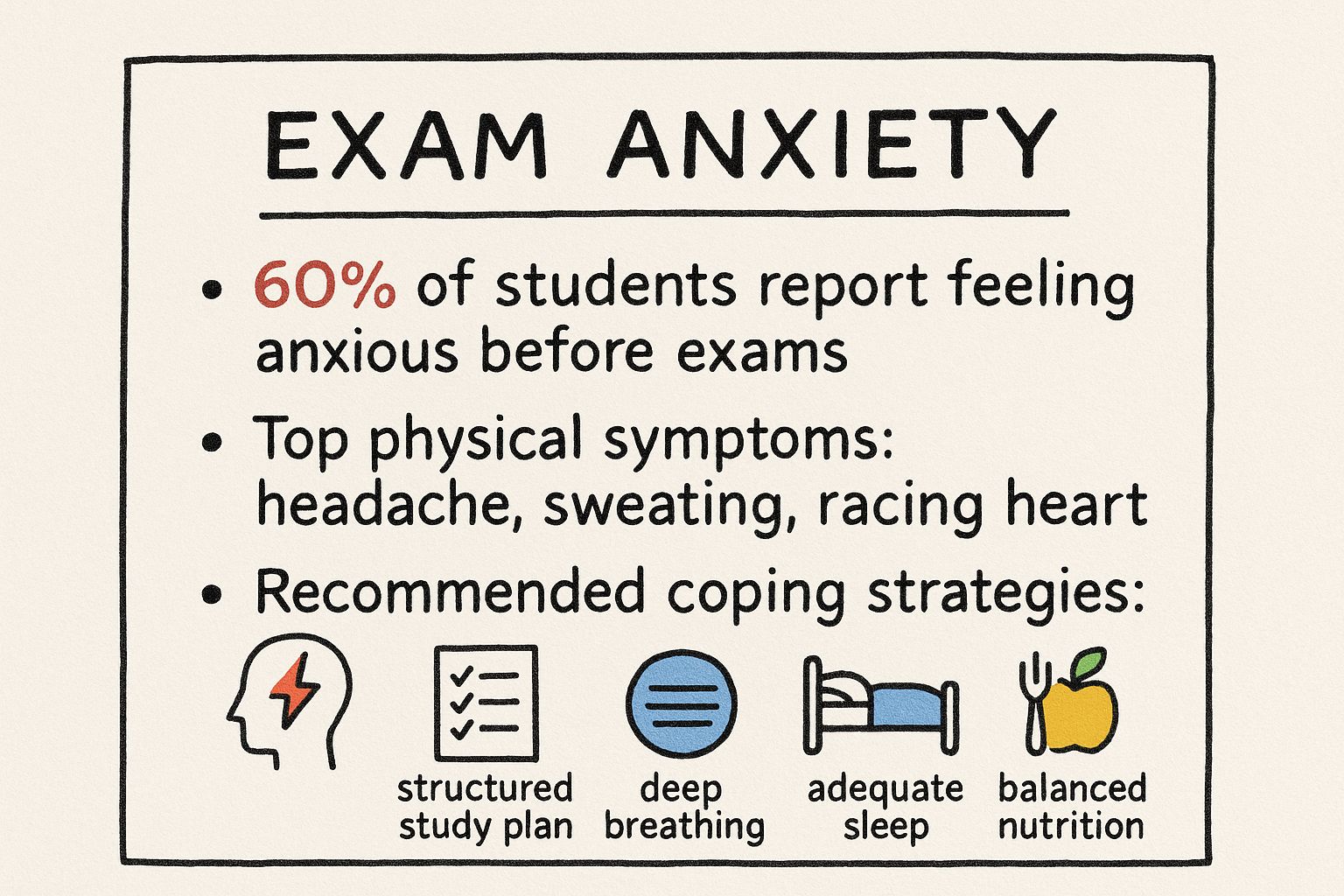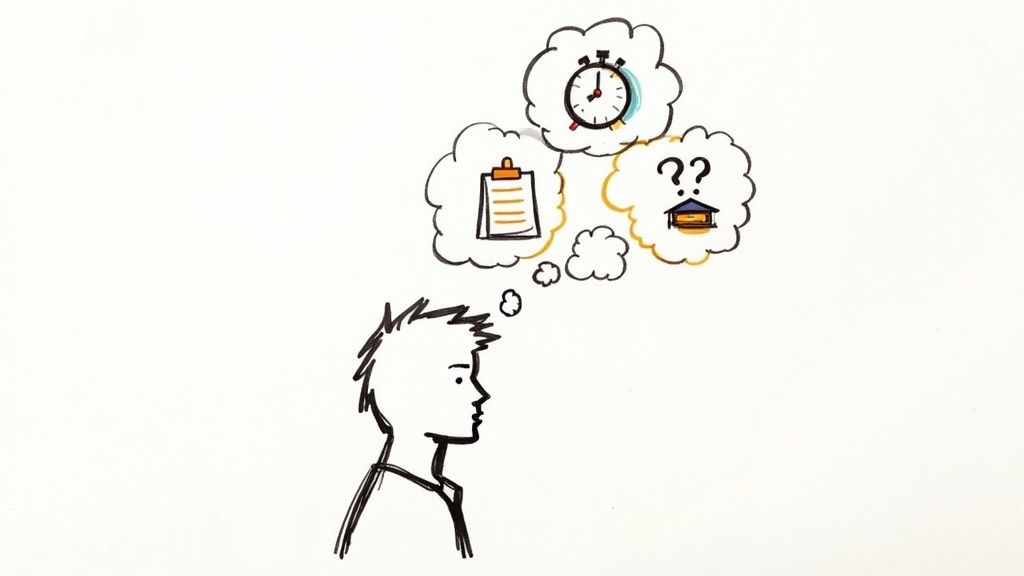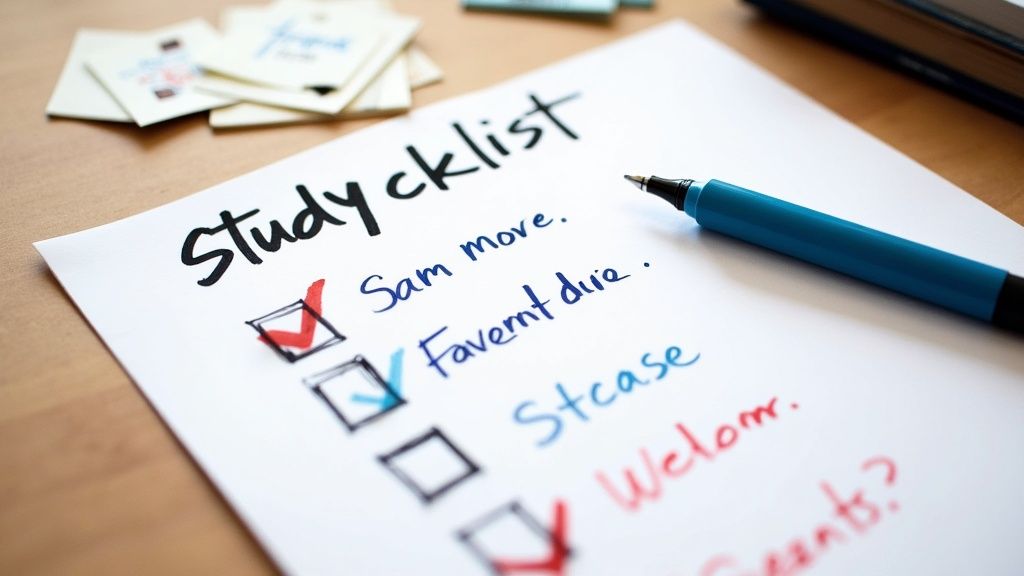Tackling exam anxiety isn't about finding a single magic bullet. It's a combination of smart preparation, shifting how you think about the test, and knowing what to do when that familiar wave of panic starts to rise. It all begins with a crucial realization: you can manage this. The goal is to move from a place of fearing failure to one of confidence built on solid, practical groundwork.
Understanding What Exam Anxiety Really Is
Let's get one thing straight—a little flutter of nerves before a big test is totally normal. In fact, it can even give you a bit of an edge and sharpen your focus. But real, debilitating exam anxiety is a different beast entirely. It's that overwhelming sense of dread, the heart-pounding panic, and the flood of "what if I fail?" thoughts that can completely derail you, no matter how many hours you've put into studying.
This isn't just about "being nervous." It's a specific kind of performance anxiety where the pressure feels so immense that your mind and body go into fight-or-flight mode. Maybe you've experienced it: you sit down to review your notes, and your brain just won't absorb anything. Or worse, you walk into the exam room, and all the information you knew cold just hours before vanishes into thin air.
The Real-World Impact of Exam Stress
If this sounds familiar, you're far from alone. Exam anxiety is a massive issue for students everywhere, fueled by ever-increasing academic pressure. The GoStudent Future of Education Report highlighted just how serious this has become, linking exam stress directly to burnout and other mental health challenges that impact both a student's well-being and their final grades.
This visual breakdown offers a clear picture of how widespread this is and points toward the kind of strategies that actually work.

The data makes it obvious: a huge number of students are in the same boat. The most effective solutions aren’t about just studying harder; they involve a balanced approach that pairs preparation with genuine self-care. The first step is simply acknowledging that this is a common, solvable problem—not some personal weakness you have to hide.
The goal isn't to eliminate stress. It's to manage it. Once you accept that anxiety is a natural response to a high-stakes situation, you can stop fighting the feeling and start controlling it.
To get there, it helps to have a clear roadmap. The strategies in this guide are built on four core pillars. Think of them as the foundation for your new, calmer approach to test-taking.
Four Pillars of Overcoming Exam Anxiety
This table gives you a quick overview of the key areas we'll be diving into.
| Strategy Pillar | Core Focus | Example Action |
|---|---|---|
| Resilient Mindset | Shifting your thoughts from fear to confidence. | Catching yourself thinking, "I'm going to fail," and replacing it with, "I've prepared for this challenge." |
| Strategic Studying | Building confidence through effective preparation. | Using timed practice exams, like those from AZ-204 Fast, to get used to the pressure. |
| In-the-Moment Techniques | Regaining control when anxiety spikes. | Quietly practicing the 4-7-8 breathing technique right at your desk before starting the exam. |
| Lifestyle Adjustments | Supporting your mental state through daily habits. | Making 7-9 hours of sleep a non-negotiable priority, especially the night before the test. |
By focusing on these four areas, you can build a comprehensive plan that not only gets you through your next exam but also equips you with skills to handle pressure in any part of your life.
Build a Resilient Mindset for Exam Success

Before you even crack open a textbook, the real work begins in your head. Your mindset is the single most powerful tool you have against exam anxiety. It's what determines whether you walk into that exam room primed for performance or crippled by panic.
Building a resilient mindset is all about learning to control your internal narrative. Think of it as mental armor. It’s not about pretending the pressure doesn't exist, but about learning how to handle it. The first step is simply listening to the stories you tell yourself. Are they full of "I'm going to fail" or "I'm just not smart enough for this"? That's the voice of anxiety, and it's time to talk back.
Reframe Your Negative Thoughts
Let's be clear: a negative thought is just a thought, not a prophecy. Once you start catching those automatic negative thoughts in the act, you can start to challenge and replace them. This isn't about blind optimism; it’s a practical technique called cognitive reframing.
Here’s what that looks like in the real world:
-
When your brain screams: "I'm definitely going to fail this exam."
-
You can counter with: "I've put in the work, and I'm going to focus on doing my best, one question at a time."
-
When you think: "My mind is going to go completely blank."
-
Try this instead: "I've practiced this material. If I get stuck, I'll take a breath, find a question I do know, and build some momentum from there."
This won't feel natural at first, but with practice, you're literally rewiring your brain's default reaction to stress. You’re shifting your focus from a made-up disaster scenario to the concrete, controllable actions you can take in the moment.
"Your mind is a powerful thing. When you fill it with positive thoughts, your life will start to change." This isn't just some feel-good quote; it’s the bedrock of building mental resilience.
And if you feel like you're the only one struggling, you're not. Far from it. The World Health Organization estimates that anxiety disorders affect roughly 4% of the global population, with many people first experiencing symptoms during their school years. Knowing you're not alone can be a huge relief. You can find more complete anxiety statistics to understand just how common this is.
Visualize Your Success
Another technique I’ve seen work wonders—and that top athletes swear by—is visualization. This isn't just daydreaming. It's a mental rehearsal where you create a detailed blueprint for success.
Find a quiet spot, close your eyes, and play a movie in your mind of exam day going exactly how you want it to.
- Picture yourself waking up, feeling rested and surprisingly calm.
- See yourself entering the exam room with a quiet confidence. You're prepared.
- Imagine reading the questions and feeling the answers click into place.
- Feel that wave of relief and accomplishment as you hand in your finished exam.
When you run through this mental simulation over and over, you strip the exam of its power to intimidate you. It becomes familiar territory. Your brain starts to accept this positive outcome as a real possibility, dialing down the fear of the unknown that fuels so much anxiety.
Adopt Study Habits That Reduce Anxiety

Let’s be honest: how you prepare for a test has a massive impact on how you feel walking into it. We’ve all been there—procrastinating until the last minute, then trying to cram everything in a frantic, caffeine-fueled haze. That's a surefire recipe for an anxiety meltdown.
The real secret to walking into an exam feeling confident isn't about studying more; it's about studying smarter. A well-thought-out study routine can transform your prep time from a source of dread into your biggest advantage. Instead of feeling overwhelmed by a mountain of material, a structured plan gives you a clear roadmap, which is the ultimate antidote to anxiety. You're no longer staring at the summit—you're just focused on the next small, manageable step.
Break Down Your Study Sessions
The thought of an eight-hour study marathon is enough to make anyone anxious. The good news? It’s also incredibly ineffective. Our brains just aren't wired for that kind of sustained, high-intensity focus.
A far better strategy is to slice your study time into focused, manageable chunks. This is where a technique like the Pomodoro Method can be a game-changer. It’s simple, but the results are powerful. Here’s the gist:
- Study hard for 25 minutes. I mean it—zero distractions. Turn off your phone notifications, close those extra browser tabs, and just focus.
- Take a 5-minute break. Get up, stretch, grab a glass of water, or just stare out the window for a bit.
- Repeat this cycle four times.
- Then, take a longer break of 15-30 minutes.
This approach helps prevent mental burnout and keeps your mind sharp. Each 25-minute block feels like a small win, building momentum and making the entire process feel less intimidating. You're turning a huge task into a series of achievable sprints.
The best way to conquer that "I'm so overwhelmed" feeling is to break it down. You don't climb a mountain by staring at the peak; you do it by taking one solid step after another. Your study plan should feel the same.
And remember, your study sessions need to be active, not passive. Simply rereading your notes creates a dangerous illusion of competence. To really know the material, you have to actively engage with it and force your brain to work.
Test Yourself Before the Test
One of the most effective ways how to overcome exam anxiety is to prove to yourself, well before the actual test, that you know your stuff. Self-testing is a form of active recall that builds genuine, unshakable confidence.
Here’s how to make your study sessions more active and effective:
- Use Flashcards (The Right Way): Don't just passively flip through them. Say the answer out loud before you turn the card over. For complex certifications like the AZ-204 exam, tools like AZ-204 Fast use this exact method with spaced repetition to help the information stick.
- Explain It to Someone Else: Try teaching a concept to a friend, a family member, or even just your dog. If you can explain it in simple terms, you've truly mastered it.
- Take Practice Exams: This is non-negotiable. Regularly taking practice tests under timed conditions is the closest you can get to the real thing.
Simulating the exam experience gets you comfortable with the format and the pressure in a low-stakes environment. You’ll find your weak spots, get a feel for the pacing, and slowly desensitize yourself to the stress. By the time the real test day comes, it'll just feel like another practice run.
Master In-the-Moment Calming Techniques

No matter how well you've prepared, that moment can still hit you. You sit down for the exam, the clock starts, and suddenly a wave of panic crashes over you. Your heart pounds, your palms get sweaty, and your brain feels like it’s filled with fog.
This is exactly when you need a mental emergency kit—a handful of powerful, discreet techniques you can use to pull yourself back from the edge right then and there.
These aren't complex, drawn-out exercises. They are quick, practical actions you can do without anyone around you even noticing. The idea is to interrupt that physical and mental spiral before it gains momentum, so you can think clearly and prove what you know.
Use Your Breath to Control Your Body
When anxiety spikes, your breathing naturally becomes shallow and quick. This tells your brain there’s a danger, which only makes the anxiety worse. The good news is you can flip this script. By intentionally slowing your breath, you send a direct signal to your nervous system that it's time to calm down.
One of the most effective and subtle methods I've come across is the 4-7-8 breathing technique. It's perfect to do at your desk right before the exam starts or anytime you hit a question that makes your mind go blank.
- Quietly inhale through your nose for a mental count of four.
- Gently hold your breath for a count of seven.
- Slowly and completely exhale through your mouth (making a soft whoosh sound) for a count of eight.
Do this cycle just three or four times. That long exhale is the secret sauce; it’s what activates your body's natural relaxation response. It’s an incredibly simple way to lower your heart rate and bring some clarity back almost instantly.
When you feel anxiety taking over, your breath is your anchor. It’s the one physiological response you have direct and immediate control over, making it the fastest way to break the panic cycle.
Learning this simple exercise is a fundamental first step in figuring out how to overcome exam anxiety as it’s happening. It gives you a reliable tool to dial down the physical symptoms that so often cause a mental roadblock.
Ground Yourself with Your Senses
Anxious thoughts are all about the future—a spiral of "what ifs" that pull you out of the present. Grounding techniques are designed to yank you out of that spiral by forcing you to focus on your physical senses right here, right now.
The 5-4-3-2-1 method is my go-to for this because you can do it entirely in your head. No one will ever know.
Silently, just to yourself, identify:
- 5 things you can see: The clock on the wall, the grain of the wood on the desk, the color of your pen. Be specific.
- 4 things you can feel: Your feet pressed firmly on the floor, the pressure of the chair on your back, the fabric of your shirt against your skin.
- 3 things you can hear: The low hum of the air conditioning, someone shuffling their feet, your own quiet breathing.
- 2 things you can smell: The scent of old paper from the exam booklet or maybe the faint smell of the room's cleaner.
- 1 thing you can taste: The lingering taste of your morning coffee or just the neutral taste in your mouth.
This sensory inventory doesn't leave any room for worry. It forces your brain to engage with the tangible world around you. Think of it as a mental reset button that can stop panic in its tracks, giving you the focus you need to get back to the exam, one question at a time.
Adjust Your Lifestyle for a Calmer Brain
https://www.youtube.com/embed/Quw6URDE_Oo
Your ability to manage anxiety isn't just about what you do in the moments before a test. It's deeply connected to your daily habits. Think of it this way: your brain and nervous system need stability to perform under pressure, and simple lifestyle adjustments can provide exactly that.
It's a lot like prepping a race car for a big event. You wouldn't just focus on the driver's skills; you’d make sure the engine has the right fuel and is perfectly maintained. Your body is no different. The food you eat, the sleep you get, and how much you move all directly impact your mental resilience when it counts.
Prioritize Restorative Sleep
When a big exam is looming, what's the first thing we usually sacrifice? Sleep. Pulling an all-nighter to cram feels like a necessary evil, but it’s one of the worst things you can do for exam anxiety. A sleep-deprived brain is an anxious brain, plain and simple. It cripples your cognitive function, sends your emotions into overdrive, and destroys your ability to recall information.
Instead of fighting your body's fundamental need for rest, build sleep into your study plan as a non-negotiable priority.
- Aim for 7-9 hours per night. This isn't just a suggestion; it's the gold standard for adults. This is when memory consolidation happens—the crucial process where your brain actually files away everything you've studied.
- Create a wind-down routine. About an hour before you plan to sleep, put the books and screens away. Signal to your brain that it's time to power down. Try reading a novel, listening to calm music, or doing some light stretching.
- Watch the late-day caffeine. That afternoon coffee might feel essential, but it can disrupt your sleep cycle for hours, even if you don't feel "wired" before bed.
Think of consistent, quality sleep as your secret weapon. It calms your nervous system and ensures all that hard work you're putting in actually sticks.
Sacrificing sleep to study more is like draining your phone battery to read an article about how to save battery life. It’s completely counterproductive. A well-rested mind is a focused, resilient mind.
Fuel Your Brain Intelligently
The connection between your gut and your brain is incredibly powerful. The foods you eat can either help regulate your mood or send it on a wild rollercoaster. While there's no magic food that will cure anxiety, a balanced diet builds the foundation for a stable mental state.
When you're stressed, it’s so easy to reach for sugary snacks or another cup of coffee for a quick energy jolt. The problem is, these choices almost always lead to a sharp crash, which only amplifies feelings of anxiety and jitters. Instead, try to focus on brain-friendly foods that give you sustained energy.
- Complex Carbohydrates: Think oatmeal, brown rice, and whole-grain bread. They release glucose slowly, providing a steady stream of fuel for your brain.
- Lean Proteins: Foods like turkey, eggs, and beans contain the amino acids your brain needs to produce mood-regulating neurotransmitters.
- Omega-3 Fatty Acids: You'll find these in fatty fish like salmon, as well as in walnuts and flaxseeds. They are absolutely essential for overall brain health and function.
Move Your Body to Clear Your Mind
You don't need to train for a marathon to get the mental benefits of exercise. Even short, simple bursts of physical activity are amazing at reducing stress hormones like cortisol and releasing endorphins—your body’s natural mood elevators.
If you feel that familiar knot of anxiety tightening while you're studying, one of the best things you can do is step away and move. A brisk 20-minute walk can be enough to completely reset your mental state, sharpen your focus, and make your next study block way more productive. Making these small, sustainable lifestyle changes is one of the most powerful things you can do when learning how to overcome exam anxiety.
Answering Your Lingering Questions About Exam Anxiety
Even with a solid game plan, you might still have some specific worries rattling around in your head. Getting straight, honest answers to these questions is a big part of feeling in control. Let's tackle some of the most common concerns I hear from students.
Is It Really Possible to Get Rid of Exam Anxiety Completely?
Honestly? No, and you wouldn't want to. A little bit of stress is actually a good thing—it's what sharpens your focus and gives you that performance edge. The real goal isn't to erase every last butterfly from your stomach, but to dial the anxiety down from a roar to a hum.
Think about a professional athlete before a championship game. They aren't totally zen; they have that nervous energy, and they channel it. That's what we're aiming for here. The strategies in this guide are designed to keep anxiety from derailing you, so you can turn that energy into fuel for success.
How Can I Help a Friend Who's Really Struggling with Exam Anxiety?
It's tough watching a friend go through this. The most powerful thing you can do at first is simply listen without trying to "fix" it. Just giving them a space to vent can lift a massive weight off their shoulders. You could also gently suggest trying a simple technique together, like going for a quick walk to reset or doing a breathing exercise you learned here.
But it's just as important to know where your role ends.
Remember, you're their friend, not their therapist. If their anxiety seems severe—we're talking frequent panic attacks, skipping school to avoid tests, or constant distress—the best support you can offer is to gently encourage them to talk to a school counselor or a mental health professional.
What Do I Do If My Mind Goes Completely Blank During the Test?
This is a classic fear, but here's the good news: it's almost always a temporary freeze, not a total memory failure. When this happens, the absolute worst thing to do is panic, because that just feeds the anxiety loop.
Instead, just stop. Put your pen down. Take a few deliberate, deep breaths to tell your nervous system it's okay. Try the 5-4-3-2-1 grounding technique we talked about earlier. Then, scan the test for a question you know you can answer—the easiest one you can find. Answering it, even out of order, creates a small victory. That little bit of momentum is often all it takes to break the mental dam and get things flowing again.
When Is It Time to Get Professional Help?
Self-help strategies are fantastic, but sometimes they aren't enough. It's time to consider reaching out for professional support if your anxiety feels like it's taking over.
Look out for these signs:
- It's Constant: The dread isn't just on exam day; it's a persistent feeling that follows you around.
- It's Physical: You're dealing with regular headaches, stomach issues, or even panic attacks.
- It's Leading to Avoidance: You start skipping classes or putting off studying altogether just to avoid the feeling.
If any of that sounds familiar, talking to a counselor or therapist isn't a sign of failure—it's a sign of strength. They have specialized tools, like cognitive-behavioral therapy (CBT), that are incredibly effective for this exact issue.
When you're gearing up for a tough technical certification like the AZ-204, confidence is half the battle. AZ-204 Fast is designed to build that confidence from the ground up, using interactive flashcards and true-to-life practice exams to ensure you don't just memorize facts, but actually understand them. Conquer your certification with confidence at az204fast.com.
Article created using Outrank

Leave a Reply